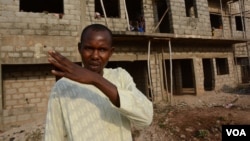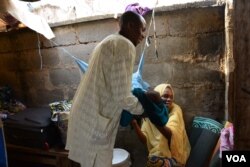More than three million people have been displaced in Nigeria - many of them fleeing the violent five-year Boko Haram insurgency. Some have taken refuge in the capital Abuja. But many say they receive little to no assistance from the government.
It’s Friday morning at the busy car park in the Garki neighborhood in Nigeria’s capital Abuja. On the roadside - next to the small shops that sell biscuits, sweetened drinks and phone recharge cards - passengers wait for taxis to take them to destinations all over the capital.
Daily life
Cruising in and out between the battered cars is Prince Bala. He came to Abuja five months ago after Boko Haram insurgents attacked Gwoza, his hometown in the northeastern part of the country.
“Coming here without papers, there weren’t a lot of opportunities for me to find work," he said. "I knew I couldn’t live without a job so I came here to the car park looking for something to do to support my family.”
At the car park he helps fill up the taxis with passengers headed to the same locations. Four people squeeze into the vehicle, each one paying for their own seat, before it takes off. The drivers pay Bala and the other young men - there are several of them working shifts at the taxi rank - between 20 and 30 naira, or about 10-15 cents.
“When we finish we will get 1,300 or 1,400 naira. If you share that between three or four people it won’t even be 500 naira each,” he explained.
Since he arrived in Abuja, Bala has gotten little or no help from the government. “I don’t know why they are not helping us. We even wrote to them and complained. They didn’t even bother to respond,” he noted.
Thousands flee attacks, violence
The government acknowledges more than one million people were displaced in 2014 alone due to the fight against an intensified Boko Haram insurgency.
Charity and humanitarian groups suspect the real numbers may be higher - but it is hard to get accurate counts in the chaos.
Thousands have flooded into Abuja in recent months. They end up living in informal settlements - and are again not counted in official statistics.
Wooden stalls line the gravel road leading to the building where Bala, his wife Haliata and the couple’s two week old daughter live with others who fled Borno state.
Humanitarian aid, slow or nonexistant
Walking past the small shops, Bala greets friends and a group of elders from his hometown. They are all struggling to get by but they help each other.
“These people are all from the same state. They are brothers and through this kind of business, they find work and something to eat. … If I buy food for 300 naira, I’ll save 100 naira for water and washing clothes and an additional 100 for donations. Every day each person pays 100 naira. At the end of the week one person collects the money so that we all can get 500 or 600 naira each," Bala explained. "This is how we live, trying to feed our families.”
Food is more expensive than in Gwoza and finding clean drinking water is difficult. They used to get water from the nearby river Bala said.
“When three children died of cholera we stopped using the water for drinking. Now we just use it to wash our clothes,” he said.
The insurgents still control Gwoza and continue to take new territory in the northeast. Borno state capital Maiduguri - with 2 million residents - remains under siege. As the attacks and fighting continue, he has no choice but to stay in Abuja with his family, he said.
“I’m not in Abuja to look for work. I’m here for peace and security. It’s still safer than Gwoza," however its not a suitable life for his baby girl, he added. “When she grows older, I will find work to afford to put her in school. In the village I would never let my child live like this.”
Until then, daily life in the capital remains a struggle.













